Thursday, December 29, 2011
Graffiti Writing A-Z: Cool Tagging Letters, Bubble Effects
Labels: Graffiti Writing A-Z
Friday, December 23, 2011
The great road toll lie.
I can’t take the BS anymore. It’s all over the radio, TV and newspapers. The endless harping on about the danger on our roads over the festive season. The massive amount of money that is being given to the police to police our roads and apparently keep us safe.
The police commissioner announces that over this christmas and new year season 16 people will die from car accidents. That amounts to one ten thousandth of one percent of the population of this state. It is a minute threat to us. Even if you add in all the injured people it is still going to be a very tiny number. There are far more serious dangers particularly from cancer and heart disease and diabetes that will kill and injure us, than motor vehicle accidents.
This amounts to a major mismanagement of public money by the government.
Graffiti
Thursday, December 22, 2011
Child psychotherapy
I was asked the other day what model do I use when I work with children and I could not answer the question. I originally trained for two years in a psychoanalytic approach to child psychotherapy but that was a long time ago and I have changed my approach considerably since that time.
Eventually in answer to the question I simply made a list of the things I would look for and do at least in the early stages of working with a child.
Usually via drawing I establish the emotional status of the child. I use the catharsis approach to feelings - identify the feeling, express the feeling and drop the feeling.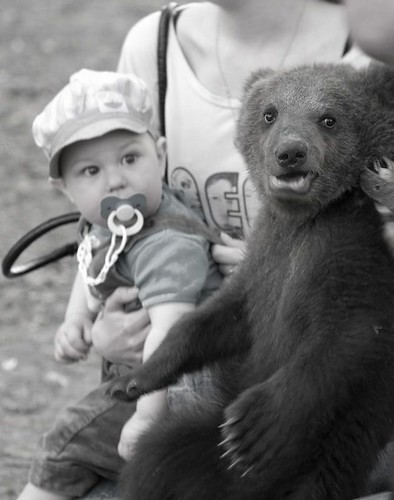
Again usually via drawing I establish the family structure as the child sees it. I ask the child to draw their family and then analyse aspects of the drawing to get an understanding of the child’s perception of the what they see as their family.
Establish the life script decisions the child has made:
Don’t
Don’t exist
Don’t be you (the sex you are)
Don’t be a child
Don’t grow up
Don’t make it (succeed)
Don’t be close
Don’t be important
Don’t belong
Don’t be well (sane)
Don’t think
Don’t feel
Don’t get your needs met
Don’t be separate
Establish the inborn temperament of the child
Rhythmicity - Regular or irregular
Approach/withdrawal - Positive or negative
Adaptability - Adaptive or non-adaptive
Intensity of reaction - Mild or intense
Quality of mood - Positive or negative
Activity level - Low or high
Attachment style between mother and child - it requires a couple of sessions with mother and child together to ascertain the attachment quality
Parenting strategies - interviews with the mother and father to discuss various parenting strategies to deal with difficult circumstances
Establish overall family structure - emeshed vs distancing family structure
Graffiti
Tuesday, December 20, 2011
Graffiti Letters: Lower Case and Upper Case Words
Labels: Graffiti Alphabet Letters
Sunday, December 18, 2011
Psychodynamics of the recreational drug user.
The social drinker unlike the alcoholic has the ability to do these transactions. The Child ego state has the desire for more but the Adult ego state and the Parent ego state have the strength to curb the excesses of the Child. 
The alcoholic or problem drug user does not have the strength in the Adult and Parent to restrict the Child ego state desire for more.
Too much?
Graffiti
Saturday, December 17, 2011
Tagging Graffiti Name "Matt Revolds"
Labels: Graffiti Tags
Wednesday, December 14, 2011
Gender identity
Gender identity - Am I male or am I female
Sexual orientation - Am I sexually or romantically attracted to the same sex or opposite sex.
Sex role - how do I practically display my gender identity and how do I relate to the opposite sex.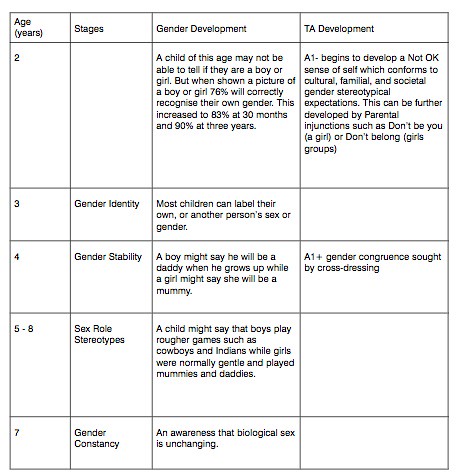
An interesting statement about cross dressing which seems to make sense. But the male cross dressers I have worked with by and large are not homosexual which does not make logical sense really. But it does indicate that gender identity and sexual orientation are two separate things.
Who am I?
Graffiti
Tuesday, December 13, 2011
10 Christmas Card Design - Graffiti
10 Christmas Card Design - Which is associated with graffiti. Please see the Christmas card designs and their creators below:

Funky graffiti designs card by ziggysofi.
Graffiti Greeting Card by ahbe123.
Graffiti Rainbow Cards by thecharacterfactory.
Thank you - graffiti cards by OutOfLimits. See the Christmas card designs on Zazzle
Labels: Christmas Card Design
Saturday, December 10, 2011
Parent's responsible for children?
KYLady says:
There’s never a dull moment in our house – we have twin daughters soon turning 16 years old. Fortunately, we learned a lot from raising their older sisters. I like your metaphor of walking the tightrope – that’s exactly what it’s like. Too far one way and we are tyrants, too far the other way and we’re accused of being uncaring. For sure, what works with one does not work with the other. I believe parents are responsible for their teens, but if they haven’t parented with clear expectations and firm guidelines in their childrens’ earlier years, it’s going to be a lot harder to influence them as they become more independent. Parenting teens is not easy, not even with good kids!
(end quote)
I would agree with your point that what happened in the parenting of the child effects what happens in the parenting of a teenager. Also that parenting styles with teenagers vary from one to another. This would also be true in childhood but I think it is more pronounced in adolescence.
I find your comment
I believe parents are responsible for their teens
an interesting one.
I know what you are saying but I don’t agree with it, sort of.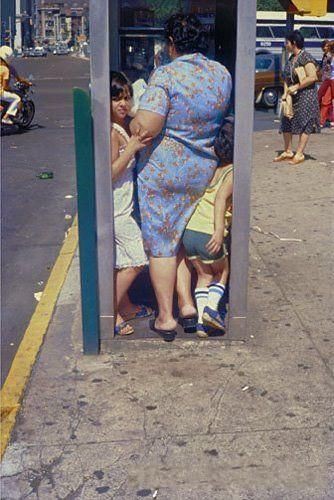
I don’t see myself or other parents as responsible for their teenagers. I provide a boundary for teenagers such that they are allowed to do A & B but not C & D. However I would not see myself as responsible for their actions nor their internal emotions. As I write this I am not too sure what I am saying.
I have a belief system in my head that I assume is communicated to my children that they are responsible for their behaviour and emotions and thoughts. I also know that when they are children they do not understand the world enough in order to survive or just operate successfully. That is where I come in and provide boundaries, make suggestions and make decisions for them. 
I decide for them that eating a large block of chocolate all at once is a very bad idea and so I stop them but that does not make me responsible for them. All I am doing is controlling a piece of behaviour.
I retreat to my dictionary and discover that responsibility is defined as:
The state or fact of having control over someone
It appears that I am incorrect in my understanding of the term because I do have control over their eating of the chocolate. So according to this definition I am responsible for my children as KYLady originally proposed.
So what am I trying to say here?
As I think here I discover I have a belief and an expectation about my children. You are responsible for yourself and what happens to you in life. There are going to be plenty of times when I am not around and then you are responsible and even when I am around you are also still responsible for what you say and do, etc.
As I write this I am thinking, “OMG, I hope this is an OK thing!!”. I was not aware of this expectation I had of them until now.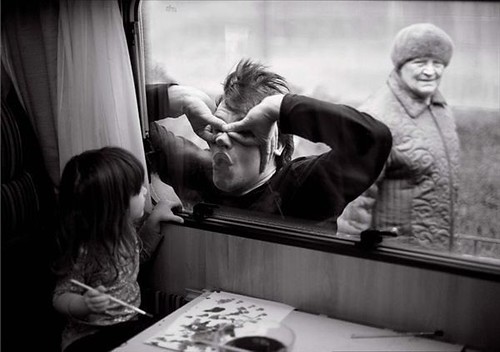
Whilst I cannot recall myself saying such things often and openly I am sure this belief was communicated subliminally to them.
I will do all the appropriate things to control their behaviour, such as with the chocolate but at the same time there is this expectation or belief about responsibility that is communicated to them as well.
This is a little bit of a light globe turning on moment as I write this. I rarely if ever said the belief I had about responsibility to them instead it was an unstated expectation of them.
So back to KYLady’s comment about parents being responsible for their children. With the dictionary saying what it said I have to agree in one way but I disagree in another way.
Graffiti
Friday, December 9, 2011
Teenage supervision
Its not a good week to be a parent in the city in which I live. Parents have come under considerable criticism by the police and parts of the press, most notably Jane Marwick in today’s daily newspaper.
As 14 - 16 year olds end the school year they go to holiday resorts and some of them get drunk and so forth. Whilst these are undoubtedly the minority they attract attention from the police and the press. The police in particular are scathing of parents who they say are not taking any responsibility as they put it and letting these teenagers run riot.
One thing the police do not say is how it should be done differently. At some point the teenager has to be left unsupervised. That is how a young person develops a sense of responsibility. If you are supervising them then they are not being responsible for them self and thus can never develop a sense of self responsibility. Sooner or later you have to let them go and do it on their own.
I have been counselling teenagers and their parents for 25 years and I am not aware of another way by which a teenager can become self responsible without being left unsupervised at some point. If Jane Marwick or the police have some idea on how to do that I would be very interested to hear it.
At what point do you let them be unsupervised and to what degree - there is no clear answer. It varies depending on the personality of the child and the relationship with the parents. It is a very difficult path for parents to walk as often it is trial and error and involves changing the plan of teenager management as you find what works and what does not. 
At times parenting teenagers involves two bad choices and it is a matter of picking the less bad choice. A strong willed 15 year old who is reacting against parental supervision can simply get up and walk out of the house. You cannot stop them. You can call the police who can find them and bring them home but then they just walk out again. This can only happen a certain number of times before they end up on the streets. A horrible scenario for parents.
Such a teenager is demanding to be unsupervised and most teenagers do this in varying degrees. When I counsel such parents and teenagers the parents again have to walk a tightrope. You certainly don’t want them being on the streets so you have to give them more unsupervised periods than you may like. The parent has to pick the lesser of two bad choices in order to maintain a relationship with the child and some degree of control. If those criticising these parents have a better solution I would be very glad to hear it.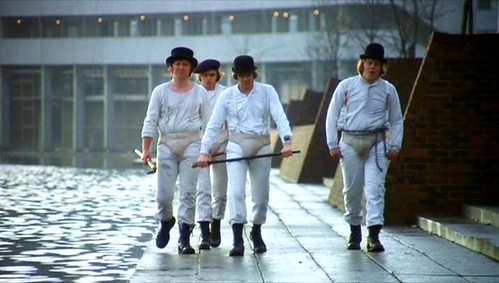
As the relationship transitions from parent/child to parent/teenager a quality of bargaining and negotiation enters into it. Almost all teenagers will do this to varying degrees. If the teenager is of a complaint nature then it may be minimal. If they are of a strong willed adversarial nature then it can be very pronounced. At times parents have to let teenagers do what they don’t want them to do in order for the longer term goals to be achieved.
At some point parents have to let teenagers be unsupervised if they are to grow into functional members of society who can self regulate. Those unsupervised times often involve undesirable behaviour, that is how the teenager learns what is desirable and undesirable.
Graffiti
Labels: counselling, parenting, teenager
Graffiti Name Maker "John"
Labels: Graffiti Name Maker
Thursday, December 8, 2011
Interviewing the child - Part 2
In the previous post Kahless says
I have never drunk a cup of coffee in my life I dont have the inclination, though i do wonder if it is because as a kid, i distinctly remember my brother telling me i dont like coffee. powerful stuff eh!
This is exactly the next point I was going to make. In the previous post I referred to the idea of the leading question. One can also make a ‘leading statement’ as it could be called. Doing such a thing in interviewing a child can be positive or negative depending on the circumstances.
Children are more suggestible than adults because their Adult ego state is in a rudimentary form. As a result when an adult says something to a child it will accept it more freely than would an adult. The child cannot do the critical analysis or factual assessment of what is being said as effectively as an adult can.
Consider this clinical situation:
A child reports that it has a pet fish which it loved very much. The previous day the cat climbed up on the aquarium, managed to snare the fish and eat it.
The child psychotherapist then says: “Oh, that is sad for you”.
This is a leading statement as it defines reality for the child.
Loss of loved fish = sad feelings
However the child may not be feeling that at all. At that point the child may be feeling anger at the cat and not sadness at the loss.
This can be a bad thing as it may lead to confusion in the child. As the child is highly suggestible it will take on the ‘facts’ provided by the counsellor much more readily. After hearing the counsellor’s comment the child may think,
“I thought what I was feeling was anger but it must sadness as I was told it was”. This can result in the child becoming confused about what is anger and what is sadness. The leading statement has resulted in a problem. The counsellor at least initially needed to ask a question, rather than make a leading statement. For example, “What are you feeling about what happened to your fish?”
In another circumstance one may be counselling a child for anger management. The child who tends to be chronically angry. After some inquiry one discovers that the young boy has learnt that sad feelings are bad things and result in bad consequences. He may have been humiliated by his father when he cried at home. What he does is cover up his sad feelings with anger which is acceptable to his father. The problem is his sad feelings are never resolved and hence he ends up being chronically angry.
Thus the counsellor can make ‘suggestions’ to the child with leading comments such as, “People feel sad when their pet dies”. As they are more suggestible the child will take this comment on more so than an adult would. Such a statement gets planted deeper in the psyche of the youngster than the adult. In this case their suggestibility is being used for therapeutic advantage. (Of course one also makes sure there is not confusion about anger and sadness). The suggestion has affirmed that sad feelings exist, that the child does have sad feelings and that such feelings are appropriate at times
The key to such suggestions is for the counsellor to get the relationship with the child right first, get their timing right and deliver it in a way that will have the most impact.
Hence we get back to the comment by Kahless
I have never drunk a cup of coffee in my life I dont have the inclination, though i do wonder if it is because as a kid, i distinctly remember my brother telling me i dont like coffee. powerful stuff eh!
---------
It is possible this was a suggestion inadvertently given by her brother. The circumstances were right at the time when he made the suggestion and she took it on as a fact. When that happens it is powerful stuff indeed my pommy friend!
Graffiti
Labels: child development, Hypnotic suggestion
Monday, December 5, 2011
Interviewing the child in the therapeutic setting
(This is a work in progress and will be added to over time).
The problem with interviewing children in counselling is that they are highly suggestible and they look to parents (big people) to define reality.
Because a child has a poorly formed Adult ego state it therefore becomes suggestible. If a child interacts with her brother then she will remember that interaction in her Adult ego state. If an adult person comes along and suggests or says things happened which did not happen then that child may take on what she was told happened rather than what actually happened. The less robust the Adult ego state the more likely this can happen.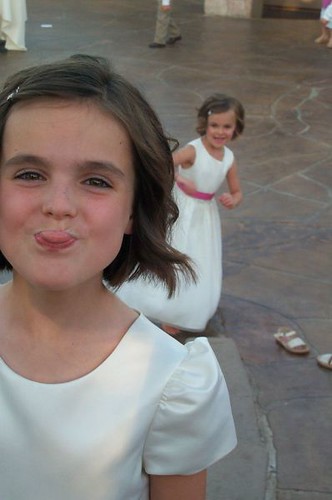
This can range from the very serious where it is believed the child may have been assaulted by someone to the benign when its a feeling about a pet fish dying.
In interviewing a child there are times when the therapist is wanting to get the facts of what happened to a child or some event they were involved in. This is the hard to do because the child is suggestible. The interviewer needs to be cautious they get the information from the child rather than suggesting facts to the child which the child then takes on as facts and presents back to the interviewer.
To avoid suggestions the interviewer must do what is known in the legal profession as avoiding asking leading questions.
“And what did your brother do to you in the back shed?” is a leading question.
Besides asking the child for information it also says to the child
You were in the back shed
Someone was there with you
That person was your brother
He did something to you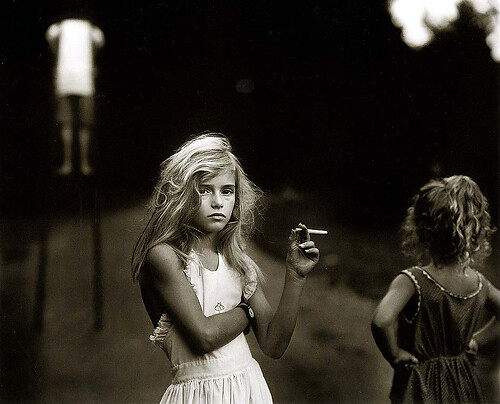
The weaker the Adult ego state the more the child will take these on as facts that actually occurred. The child may not have been in the back shed for two years. It all of a sudden starts thinking
“I was not in the shed but he said I was so maybe I was and I don’t remember it right”.
The child has now become highly suggestible. Its already weak Adult ego state has become even weaker. It has accepted that in this interview what it recalls is probably inaccurate and the interviewer is in essence telling it what really happened.
This can be made even worse when the interviewer confronts an answer. The child may respond with some sort of comment about not being in the shed. The interviewer takes this as a repression of the event because it was traumatic or maybe as an attempt to protect the brother. He then questions the accuracy of the child in recalling where the event took place and the child’s belief in their recall of the facts is made even more fragile.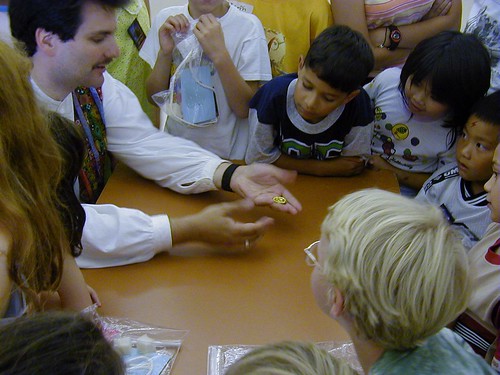
Did it really happen?
Thus in interviewing a child one at times must avoid asking leading questions. If one is wanting to get facts from a child leading questions must be avoided. One asks questions with no or very few assumptions in them. One could ask
Where did you play that day?
What were you playing?
Do you play that game by yourself or with other people?
Who have you ever played that game with?
Is it fun to play with him?
As you can see these questions head in the same direction as the question
“And what did your brother do to you in the back shed?”
But they are allowing the child to define when, where, who and what. I would also be asking these questions whilst having the child distracted by some activity such as drawing. This allows the child more ‘space’ and one can look for changes in the child’s drawing (Behaviour) as the questions are being asked.
Here I have given an example of a legal type of situation which child psychotherapists are sometimes required to do. Leading questions also can interfere in the therapeutic process in a more psychological way which will be discussed next.
Graffiti
Sunday, December 4, 2011
Oral stage of development
The oral stage fixation is often associated with the highly dependent person. That person who may have dependent relationships on others or develop a strong dependnecy on a drug of some kind.
These are some of the features of people who have an oral stage fixation.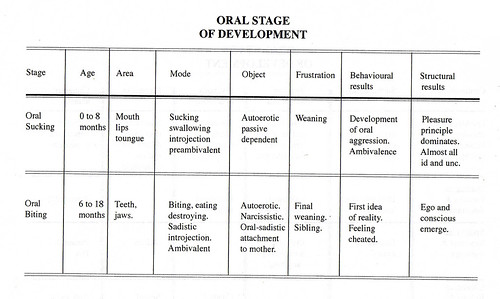
The oral stage of development is broken into two parts. Initially there is the oral sucking stage which is followed by the oral biting stage, which breast feeding mothers can tell you about!
In the second digram the top two rows relate to the oral sucking stage and the bottom two rows relate to the oral biting stage
Oral sucking stage fixation
Pro-ana. Oral biting stage fixation
Graffiti
Labels: drug addict, oral stage
Graffiti Black Book Character MatyL
Labels: Graffiti Blackbook
Wednesday, November 30, 2011
Co Counselling
I was going through some old notes the other day and came across a mention of co counselling. I was always fascinated by the idea of co counselling but never actually did any myself.
I haven’t heard of co counselling even being mentioned for many years. I think it would have been in the early 1990’s when it was all the rage for about a year or two and then disappeared never to be heard of again. Funny how the counselling industry has fashions like that, which come and go.
Co counselling is about therapists getting therapy from other therapists. Therapists getting personal therapy is a good idea for two reasons. First it gives them an opportunity to work on their own issues and secondly a “training analysis” as it is sometimes called is a great way to learn therapy. The therapist as a client gets to see another therapist work not only by observing but also by being directly involved in the process. A great way indeed to learn the art of psychotherapy.
However co counselling has extra special interesting factors than just a therapist getting therapy from another therapist. Two therapists meet and decide they want some therapy and it goes like this:
Week 1.
Person A is therapist
Person B is client
Week 2.
Person A is client
Person B is therapist
Week 3.
Person A is therapist
Person B is client
Week 4.
Person A is client
Person B is therapist
and so on.
Each week they swap the roles of therapist and client. A most interesting proposal indeed. For instance what happens with the transference? It would provide a most interesting experiment on the nature of transference to see what did happen.
Social experiments involve risk. If you never take a risk what will you end up with?
Transference is where the client develops a strong attachment and feelings for the therapist. Often the feelings are not reality based. The client starts to put mother’s face onto the therapist and react to her/him in the same way she did 30 years ago to mother.
This happens because the therapist is in the power position with the client and the client starts this transferring process. Sometimes the transference feelings can be quite strong indeed. In co counselling the therapist and client switch roles each week.
What impact will that have on the transference process?
Will both develop a transference?
Will neither develop a transference?
If one or both parties develop some transference how can that be managed in the co counselling process?
Most interesting questions indeed.
It provides a quite different perspective from which to examine the whole therapeutic process.
Graffiti
Labels: Co Counselling
Tuesday, November 29, 2011
Overdose
It is an interesting process. I just stopped writing for two weeks. There was no decision to, I just did. The previous month I produced a lot of words for the book I am writing on counselling drug users. I just started writing again today.
It was similar to the first book. I treat my Free Child with great care which is a good thing really, therapeutic as well. I listen closely to it or more just follow its lead. I don’t push myself at all to write. I don’t have a schedule of writing. I need to be very careful of my rebellious side and not to engage it in this large writing project.
I must admit I do start to wonder a bit as a week goes by and nothing has been written. But I sit back and let the FC take charge. I suppose I am trusting it a bit more as I know it will come back to the keyboard when ready. That happened last time and is happening this time.
Yesterday I mentioned this to someone and they asked if I had writers block. I don’t think so but then I don’t really know what writers block is. I didn’t feel blocked. It is more a feeling of I am taking very close care of that part of me and trusting it will do its stuff when ready.
Heroin overdose
One hears this term quite a lot but it is in fact somewhat of a misnomer.
Part of chapter 2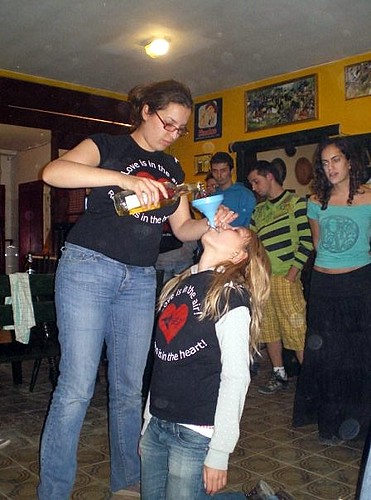
Poly drug use.
Anyone in the drug counselling field will come across the term poly drug use. This is seen to be the contrary of mono drug use. In real terms there would be very few mono drug users on the planet. The vast majority of people are poly drug users. If one has a wine during dinner and a cup of coffee at the end then they are a poly drug user using both alcohol and the stimulant caffeine. However the term poly drug use usually refers the use of illicit drugs maybe with alcohol at the one time. The person ingests a combination of drugs in the one session.
Where poly drug use assumes most importance is when considering the possibly of drug over dose. The drug counsellor needs to be cognizant with the effects of possible combinations of drugs. Over dose from one single drug is much less common that over dose from multiple drug consumption. One study of drug related over dose, Hickman et al (2006) found only one drug present in just eleven percent of deaths with the average being more than three drugs detected. The most common drugs found in over dose were heroin, cocaine, benzodiazepines, alcohol and methadone. The least common were amphetamines, ecstacy and cannabis. (Also see Newcombe and Woods (2010), McKenna (2002) and Giroud et al (1997))
As a matter of course any drug counsellor will enquire as to what drugs the client is using. They should specifically ask if the person uses heroin, cocaine, benzodiazepines, alcohol and/or methadone and in what combinations in any one drug taking session. If there is a combination used then the counsellor would obviously inform the client of the potential for over dose and look at ways by which the client can reduce the risk of a fatal over dose, such as not using alone and so forth.
(end quote)
As you can see it would be more correctly named as a poly drug overdose as only 11% of fatal overdoses result from the ingestion of one drug. 89% result from a combination of drugs taken. So how can you say which one was the fatal one or played the most part in the death? So heroin overdoses are rarely just heroin over doses.
This comes from chapter 5
Research study
Kerr, D., Dietze, P., Kelly, A. and Jolley, D.
“Improved response by peers after witnessed heroin overdose in Melbourne”. Drug and Alcohol Review. 2009. 28, 327 - 330.
Heroin related over dose
Current IDU recruited at a needle and exchange programme (ie not recreational users)
61% had reported they over dosed after injecting heroin with the median being 3 times
84% reported witnessing an over dose with the median being 4.5 times
46% reported witnessing an overdose in the last 6 months
These figures show that these people are really living on the edge of self destruction. To go that close to death that often would strongly suggest some suicidal or self destructive urges play a part in what they do.
It should be noted that the subjects in this study would be the dependent drug users and not the recreational heroin users because of how they were recruited for the research.
Graffiti
Labels: drug counselling, free child, heroin
Sunday, November 27, 2011
7 Best Graffiti Art Mural Face of Juseone
Graffiti murals wallpaper male
Graffiti murals on the walls of a woman's face. Graffiti creator juseone
Labels: Graffiti Murals, The best graffiti
Popular Posts
-
Graffiti Fonts: Russian Alphabet Translation. Russian Alphabet Converter. See Russian letters above and below. Very different from the lette...
-
Approximately 30% of people who complete a suicide leave a note of some kind. They can provide valuable insight into the psychology of the p...
-
There are eight main psychological struggles that children and teenagers need to resolve before they become psychologically complete as an a...
-
One of the eight reasons why some people self harm is because of a self hatred or as a form of self punishment. As a result of childhood exp...
-
How to make graffiti alphabet with Photoshop Text Effects? The following is a tutorial on how to create graffiti with Adobe Photoshop: 1. ...
-
Habit is all about the relationship between repetition and automaticity. If a person starts a new behaviour and repeats it every day how lon...
-
I was talking with someone the other day about therapy and contracts and an interesting notion came up about contracts and promises. All t...
-
How can one go by without saying a few words about Tiger. Firstly what about all the jokes currently doing the rounds about Tiger and his wa...
Archives
Labels
- 2011 Graffiti Alphabet (1)
- 3 Graffiti Letters ABC (1)
- 3 New Style Graffiti (1)
- 33rd Graffiti Shop (1)
- 3D Graffiti (12)
- 3D Graffiti Alphabet (3)
- 3D Graffiti Art (2)
- 3d graffiti creator (1)
- 3D Graffiti Letter (1)
- 3D Illusion Graffiti (2)
- 3D street art graffiti (2)
- 5 Graffiti Creator (1)
- A-Z Alphabet (1)
- A-Z Alphabet Street (1)
- AA (1)
- abandonment (3)
- ABC Graffiti (4)
- ABC Graffiti Alphabet (1)
- ABC Graffiti Letters (2)
- ABC Latters (1)
- Abecedario de Grafiti (1)
- Abecedario Espanol Ingles (1)
- Abecedario Gotico (1)
- Abecedarios 3D (1)
- Abecedarios 3D Graffitis (1)
- Abstract Graffiti (2)
- Abstract graffiti art (1)
- Abstract graffiti design (1)
- abuse (1)
- acting out (1)
- adapted child ego state (2)
- adolescence (3)
- adolescent (1)
- Adult ego state (12)
- aggression (1)
- Airbrush Graffiti (1)
- alcohol (1)
- Alfabet Graffiti (1)
- ALFABETO ABECEDÁRIO (1)
- Alfabeto De Graffiti (1)
- Alfabeto de Letras de Graffiti (1)
- Alfabeto Graffiti (2)
- Alfabetos Cairo (1)
- Alphabet (1)
- Alphabet Gothic (1)
- Alphabet Graffiti (4)
- Alphabet Graffiti On Boxcar (1)
- Alphabet in Bubble Graffiti Letters (2)
- Alphabet in Bubble Letters (1)
- Alphabet Letters Black White (1)
- Amazing Graffiti (1)
- amy winehouse (1)
- anger (13)
- anorexia (4)
- anorexic (1)
- Anti Graffiti Coatings (1)
- antiscript (1)
- anxiety (6)
- ART OF Graffiti (1)
- assault (1)
- attachment (5)
- AZ Graffiti (1)
- B in Graffiti Letters (1)
- Banksy Graffiti (6)
- Banksy Graffiti Art Flower (1)
- Banksy Graffiti Change (1)
- Banksy Graffiti Images (1)
- Be Perfect (1)
- ben cousins (2)
- Bereavement neurosis (1)
- bioenergetics (1)
- bitch (1)
- Blackbook Graffiti (1)
- Blue Graffiti Alphabets (1)
- blushing (1)
- Body script (1)
- Boingo Graffiti (1)
- bubble alphabet (1)
- Bubble Graffiti (1)
- Bubble graffiti alphabet (1)
- Bubble Letters Graffiti (1)
- Bubble Style Graffiti (1)
- Bubble Writing Alphabet A-Z (1)
- bulimia (3)
- bully (2)
- cannabis (3)
- car accident (1)
- Car Graffiti (1)
- Carl Rogers (3)
- Cartoon graffiti canvas (1)
- Cartoon Letters (1)
- Castle Graffiti (1)
- change (1)
- character (1)
- Chicago Gang Graffiti (1)
- child (1)
- child development (20)
- child ego state (30)
- childhood (2)
- Childhood fantasy (6)
- children (6)
- Christmas Card Design (1)
- cigarettes (1)
- clients and trust (3)
- Co Counselling (1)
- conflict (1)
- conforming child (2)
- contextual diagnosis (1)
- contract (3)
- contracts therapy (1)
- Cool Alphabet (1)
- Cool Blue Graffiti Alphabet (1)
- Cool Graffiti Fonts (2)
- Cool graffiti letters (2)
- Cool Graffiti Style (6)
- Cool Letter Designs (1)
- copy cat suicide (5)
- counseling (1)
- counselling (37)
- couples counselling (4)
- Create graffiti (1)
- Create Graffiti Alphabet (1)
- Creative Graffiti (1)
- Critical parent (2)
- Cursive Alphabet (1)
- cutters (1)
- cutting (1)
- cyber bully (1)
- Daim Graffiti (2)
- daydream (3)
- death (2)
- death ritual (1)
- decision (1)
- defence mechanism (2)
- delusion (1)
- Dependent personality (1)
- depersonalization (2)
- depression (5)
- derealization (1)
- Desensitization (1)
- despair (1)
- diagnosis (1)
- Different Types Of Alphabet Letters (2)
- discipline (2)
- disjointed (1)
- dissociation (3)
- Dragon God Graffiti (1)
- Dragon Graffiti (1)
- Draw Graffiti (3)
- Draw Graffiti Alphabet (2)
- Draw Graffiti On Paper (1)
- Drawing Graffiti Sketch (1)
- drug addict (8)
- drug counselling (7)
- Drug use (15)
- drugs (2)
- early decision (3)
- eating (3)
- ego state (6)
- ego states (22)
- emeshed (2)
- emeshment (1)
- Emotional literacy (1)
- emotions (2)
- empathy (1)
- Encropesis (1)
- engulfment (1)
- envy (1)
- Epic Graffiti (1)
- epiphany (1)
- erectile dysfunction (1)
- EROS AND THANATOS (1)
- Erotic transference (3)
- eyes (1)
- Family (1)
- family system (1)
- Fancy Letters (1)
- feelings (5)
- fight (1)
- flight (1)
- Font Graffiti 2012 (2)
- Fonts Fancy (1)
- forgiveness (1)
- free child (18)
- Free Graffiti Fonts (1)
- Freehand Graffiti (1)
- friendship (1)
- Fuentes de la pintada (1)
- funeral (1)
- Funny Graffiti (3)
- Gambling addiction (1)
- games (1)
- Gang Graffiti (4)
- gender (1)
- genius and creativity (1)
- Ghttp://www.blogger.com/img/blank.gifraffiti Style (1)
- goodbye work (1)
- gossip (1)
- Gothic graffiti letters (2)
- Graffihttp://www.blogger.com/img/blank.gifti style alphabets (1)
- graffit alphabet (1)
- Graffithttp://www.blogger.com/img/blank.gifi alphabet letters (1)
- Graffiti (2)
- Graffiti 2012 (1)
- Graffiti ABC (2)
- graffiti airbrush (1)
- Graffiti airplane (1)
- Graffiti Alfabeto (9)
- Graffiti alphabet (63)
- Graffiti Alphabet 5 Colors (1)
- Graffiti Alphabet A to Z (3)
- graffiti alphabet a-z (10)
- graffiti alphabet B (4)
- Graffiti Alphabet Book (1)
- Graffiti Alphabet Bubble (2)
- Graffiti Alphabet Coloring (1)
- graffiti alphabet fonts (2)
- Graffiti Alphabet Gradient (1)
- Graffiti Alphabet J (1)
- Graffiti alphabet K (1)
- Graffiti Alphabet L (1)
- Graffiti Alphabet L and M (1)
- Graffiti Alphabet Lettering (1)
- Graffiti Alphabet Letters (97)
- Graffiti Alphabet Letters A (1)
- Graffiti Alphabet Letters A Through Z (2)
- graffiti alphabet letters A-Z (1)
- Graffiti Alphabet Milk (1)
- Graffiti Alphabet Paper (1)
- Graffiti Alphabet Printables (1)
- graffiti alphabet printouts (3)
- Graffiti Alphabet Sets (1)
- Graffiti Alphabet T-Shirts (1)
- Graffiti Alphabet Taggings (1)
- Graffiti Alphabet WOLER (1)
- Graffiti Alphabets (22)
- Graffiti Alphabets On Hand (1)
- Graffiti Alphabets Pink (1)
- Graffiti and Experimental (1)
- Graffiti Archaeology (1)
- Graffiti Arrows (1)
- Graffiti Art (23)
- Graffiti Art Alphabet (1)
- Graffiti Art Creator (1)
- Graffiti Art Mural (2)
- Graffiti art murals flower (1)
- Graffiti Art Not Colored (1)
- Graffiti Art Wall (3)
- Graffiti artist (1)
- Graffiti Backgrounds (1)
- graffiti bhttp://www.blogger.com/img/blank.giflack and white (1)
- Graffiti Billboards (1)
- graffiti black and white (1)
- Graffiti Blackbook (8)
- Graffiti Blackbook Sketches (1)
- Graffiti Blitz (1)
- Graffiti Bock (1)
- Graffiti bubble (5)
- Graffiti Bubble Letters (2)
- graffiti calligraphy (1)
- Graffiti Cans (3)
- Graffiti Canvas (5)
- Graffiti canvases (1)
- Graffiti Cartoon Characters (5)
- Graffiti cartoons (1)
- Graffiti Characters (12)
- Graffiti Christmas (1)
- Graffiti Controversy (1)
- graffiti cool (5)
- Graffiti Cool Names (1)
- Graffiti Cope (1)
- Graffiti creator (8)
- Graffiti Creator Murals (1)
- Graffiti Designs Pictures (1)
- Graffiti Desktop Wallpaper. Graffiti Wallpaper (1)
- graffiti digital (1)
- Graffiti Drawing Tips (1)
- Graffiti Drawings on Paper (2)
- Graffiti Drum (1)
- Graffiti Elite (1)
- Graffiti faces (1)
- Graffiti Fire (1)
- Graffiti Flashing (1)
- Graffiti Flowers (1)
- Graffiti Font (1)
- Graffiti Fonts (41)
- Graffiti Fonts A (1)
- Graffiti Fonts Alphabet (1)
- Graffiti Fonts Curly (1)
- Graffiti Fonts Political Graft (1)
- Graffiti Fonts Writers (1)
- Graffiti freight trains (3)
- Graffiti Funny (1)
- Graffiti Generator (1)
- Graffiti Generators (1)
- GRAFFITI Graphics (7)
- Graffiti Halloween (2)
- Graffiti Handstyles (1)
- Graffiti Handwriting (1)
- Graffiti Happy B'Day (1)
- graffiti hip hop (1)
- graffiti in the hat (2)
- Graffiti Is Art (1)
- Graffiti Juan Benet (1)
- Graffiti Leters (1)
- graffiti letter (1)
- Graffiti Letter A (2)
- Graffiti Letter B (3)
- Graffiti Letter J (1)
- Graffiti Letter K (1)
- Graffiti Letter P (1)
- Graffiti Letter Styles (1)
- Graffiti Letters (13)
- Graffiti Letters ABC (1)
- Graffiti Letters Blue (1)
- Graffiti Letters Boingo (1)
- Graffiti Letters Bukue (1)
- Graffiti Letters K (1)
- Graffiti Letters Milk (1)
- Graffiti letters Z (1)
- Graffiti Letters Zeck (1)
- Graffiti logo creator (1)
- Graffiti logo HRC (1)
- Graffiti Logos (2)
- Graffiti Lorgo (1)
- Graffiti Love (3)
- Graffiti Mural (1)
- Graffiti Murals (7)
- Graffiti Muras (1)
- Graffiti Name (1)
- Graffiti Name Maker (1)
- graffiti names (5)
- Graffiti Names A-Z (1)
- Graffiti NY (1)
- Graffiti Ohio (1)
- Graffiti on Glass (1)
- Graffiti On http://www.blogger.com/img/blank.gifPaper (1)
- Graffiti On Paper (5)
- Graffiti on the beach (1)
- graffiti on trains (3)
- Graffiti Photography (1)
- graffiti photoshop (1)
- Graffiti Pictures (1)
- Graffiti Piece (1)
- Graffiti Printable (1)
- Graffiti Quake (1)
- Graffiti Removal (1)
- Graffiti San Francisco (1)
- Graffiti Skateboard (1)
- Graffiti Sketch (15)
- Graffiti Sketch 3D (1)
- Graffiti Sketch P (1)
- Graffiti Sketch Pen (1)
- Graffiti Sketchbook (1)
- Graffiti sketches (50)
- Graffiti Sketching (1)
- Graffiti Skull (3)
- Graffiti Slank (1)
- Graffiti Spray Cans (1)
- Graffiti Stack (2)
- Graffiti Stencils (2)
- Graffiti Stickers (2)
- Graffiti Street Art (70)
- Graffiti Style (6)
- Graffiti Style Black And White (1)
- Graffiti T-shirts (2)
- graffiti tag (2)
- Graffiti Tag Name (1)
- Graffiti Tag Styles (4)
- Graffiti Tagging Alphabet (2)
- Graffiti Tags (3)
- Graffiti Tags Alphabet (1)
- Graffiti Text (1)
- Graffiti Text Generator (1)
- Graffiti Theme Music (1)
- Graffiti Tips (1)
- Graffiti Train (3)
- Graffiti Train WOLER (1)
- Graffiti Trains (13)
- Graffiti Trains Kaser (1)
- Graffiti tribal (1)
- Graffiti Truly Design (1)
- graffiti tutorial (1)
- Graffiti Wall (3)
- Graffiti Wildstyle (2)
- Graffiti Writers (1)
- Graffiti Writing (2)
- Graffiti Writing A-Z (1)
- Graffiti Yamaha R1 (1)
- Graffti Illusion (11)
- Grahttp://www.blogger.com/img/blank.gifffiti Street Art (1)
- Graphic Graffiti (1)
- grief (1)
- group therapy (6)
- guilt (1)
- habit (2)
- happy (1)
- here and now (1)
- here and now. life script (5)
- heroin (2)
- homeless (1)
- homosexuality (1)
- Honda Graffiti (1)
- How to Create graffiti (2)
- How to Draw a Graffiti K (1)
- How To Draw Graffiti (4)
- How to Draw the Graffiti Alphabet Letters (1)
- how to make graffiti (1)
- How to Tag Graffiti Alphabet Letters (1)
- How to Write Bubble Letters (1)
- How To Write Graffiti (2)
- How to write my name in graffiti (1)
- human communication (2)
- human development (1)
- hurried child (1)
- hypnosis (1)
- Hypnotic suggestion (4)
- hysteric (1)
- idealization (1)
- illusion graffiti alphabet (1)
- Illusionist Graffiti Alphabet (1)
- im OK (1)
- Imagination and two chair (1)
- impasse (1)
- indecision (1)
- independence (1)
- individualism (1)
- Individuation (2)
- insomnia (1)
- introjection (2)
- Japanese Graffiti (1)
- Jealousy (1)
- Korean Alphabet Graffiti (1)
- Latin Kings Graffiti (2)
- Latina Graffiti (1)
- Learn Graffiti (1)
- Letra De Graffiti (1)
- Letra de graffiti alfabeto (1)
- Letter B (1)
- Letter Fonts (1)
- Lettering Fonts (1)
- Lettering Styles (1)
- Letters (1)
- Letters L (1)
- libido (1)
- life position (1)
- Life positions (1)
- life script (9)
- Light Graffiti (1)
- lilith (1)
- loss (1)
- loss of control (1)
- love (3)
- Love and marriage (1)
- Madness (1)
- magical thinking (1)
- Make your own graffiti (1)
- making graffiti (2)
- Male mid life crisis (1)
- marijuana (3)
- Marriage (2)
- masturbation (1)
- mental health (1)
- Mexico Graffiti (1)
- mid life crisis (2)
- modeling (1)
- Mona Lisa graffiti (1)
- MR Wiggles Graffiti Alphabet (1)
- munchausen syndrome (1)
- Murales del Creador (1)
- murder (1)
- mute (1)
- My Name in Graffiti (1)
- narcissism (1)
- Negative transference (2)
- Negative transference and real feelings (1)
- neglect (1)
- neurosis (1)
- New graffiti (3)
- New Graffiti Alphabet (2)
- No Graffiti Logo (1)
- obsessive compulsive (2)
- OCD (1)
- Old Lettering A-Z (1)
- oral stage (1)
- over protection (1)
- Palestinian graffiti alphabet (1)
- panic (2)
- panic attack (2)
- paranoid (1)
- parent contract (2)
- parent ego state (8)
- parenting (5)
- peace (1)
- perfectionism (1)
- personality (1)
- personality types (4)
- Personality types and disorders (1)
- phallus (1)
- Piaget (1)
- Pink Graffiti (1)
- Pink graffiti alphabet Z (1)
- play therapy (1)
- Political Graffiti (1)
- pornography (1)
- positive transference (1)
- power (1)
- pre-verbal (1)
- Printable Alphabet (1)
- Printable Graffiti Alphabet (1)
- Printablehttp://www.blogger.com/img/blank.gif Letters Car (1)
- procrastination (2)
- Projection (4)
- Promiscuity (1)
- promise (1)
- psychoanatomy (1)
- Psychological polarities (1)
- psychology (4)
- psychology of revenge (1)
- psychosis (1)
- psychosomatic (1)
- psychotherapy (3)
- ptsd (1)
- racket (1)
- rebellious child (1)
- rebirth (1)
- Red graffiti alphabet (1)
- Red Graffiti Sketches (1)
- redecision (1)
- regression (4)
- relational (1)
- relationships (6)
- repetition compulsion (1)
- Resilience (1)
- Romanian Graffiti (1)
- Russian Alphabet (1)
- Russian Alphabet Letters (1)
- scare (1)
- schizoid (1)
- script currency (1)
- self esteem (1)
- Self grooming (1)
- self harm (8)
- self hatred (1)
- separation from parents (3)
- serbian (1)
- serial monogamy (1)
- sexual dysfunction (1)
- Sexual repression (2)
- shame (4)
- Skam graffiti (1)
- Sketch graffiti (1)
- Sketching Alphabet (1)
- Skype counselling (1)
- sleep walking (1)
- sleep. love (1)
- small talk (1)
- smoking (1)
- social isolation (1)
- social phobia (1)
- socialization (1)
- soothing (1)
- Stencils Letters (1)
- Street art artists (1)
- stress (1)
- strokes (1)
- style graffiti (2)
- Sublime logo graffiti (1)
- suggestible (1)
- suicide (17)
- suicide pact (3)
- suicide risk (4)
- Surfboard designs graffiti (3)
- Surfboard Designs Graffiti (1)
- Tag Graffiti Alphabet (4)
- Tag Graffiti Fonts (1)
- Tagging Letters (1)
- Tagging Letters A Z (1)
- Tagging Letters A-Z (1)
- Tags Graffiti Art (1)
- teenage suicide (3)
- teenager (6)
- temper tantrum (3)
- The best graffiti (1)
- The Letter L in Graffiti (1)
- The Seventh Letter (1)
- therapeutic communication (1)
- Therapists (1)
- therapy (22)
- thinking (1)
- Tiger (1)
- Tips and Advice on How To Make Graffiti (1)
- Tips and Warnings How Tag Graffiti (1)
- toilet training (1)
- torture (1)
- transactional analysis (14)
- Transactional Analysis sentence completion test (3)
- transference (4)
- Transference cure and introjection (1)
- trauma debriefing (2)
- treatment plan (1)
- Tribal Font Alphabets (1)
- Tutorial Graffiti (1)
- Two ego state model Parent (1)
- unconscious (1)
- Unique graffiti (1)
- Uppercase and lowercase letters (1)
- urban graffiti (1)
- vaginismus (1)
- victim (2)
- Wall Murals (1)
- war (1)
- Wildstyle Graffiti (1)
- Wildstyle graffiti alphabet (1)
- Wildstyle graffiti letters (1)
- World Cup 2010 (1)
- Write Graffiti Blackbook (1)
- Write My Name In Graffiti (20)
- writing (1)
- Writing Graffiti (1)
- Z Graffiti Pink (1)

























